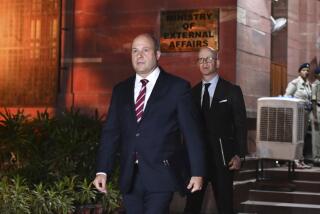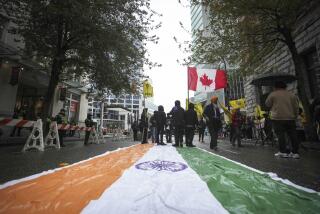Iraq Expels 3 U.S. Diplomats, Europe Envoys
- Share via
AMMAN, Jordan — In a further escalation of tension in the Persian Gulf crisis, Iraq ordered the expulsion Friday of three U.S. diplomats and the military attaches of 11 Western European nations.
The United States promptly responded by announcing that three diplomats at the Iraqi Embassy in Washington, including the military attache, must leave. All the envoys ordered out of both Baghdad and Washington were given a week to get their affairs in order.
“This action comes as a result of the Iraqi government’s expulsion of our embassy’s defense attache and two other diplomatic officers,” State Department spokeswoman Margaret Tutwiler said in Washington.
The mounting battle of diplomatic expulsions came on a day when a tough message from Iraqi President Saddam Hussein warned his people to prepare for war against the “dwarfs and small people” aligned against him. He vowed there will be no retreat.
Officials in Europe said their military specialists and other embassy personnel had been ordered out of Iraq in apparent retaliation for the European Community’s decision Monday to expel Iraqi diplomats.
Of the 12 EC member countries, only Portugal said it had not received an expulsion order from the Iraqi authorities. Portugal has no military attache at its Baghdad embassy.
The total number of European diplomats being expelled was not clear, but it appeared that several envoys from each nation would be affected. Officials in Cairo said the Egyptian military attache also had been told to leave Iraq.
“The expulsion is a reaction to what we did to them,” British Foreign Secretary Douglas Hurd said at a news conference in London. “I am keen that the rest of the (embassy) staff in Baghdad should be able to carry on with their job helping the British community.”
Tutwiler said Deputy Assistant Secretary of State Jock Covey phoned Iraqi Ambassador Mohammed Mashat to protest the expulsions in Baghdad and to inform him that Iraq must now make similar cuts in its own staff.
On Aug. 27, the United States told Iraq to reduce its embassy staff of 55 to 19. A few days later, Iraq also restricted the number of American diplomats in Baghdad to 19.
The current round of expulsions began after Iraqi troops in Kuwait forced their way into the diplomatic compounds of France, Canada and Belgium last week and detained diplomatic personnel who had stayed on in defiance of an Iraqi order to shut down.
The French military attache was detained for several hours, and in response, French President Francois Mitterrand ordered Iraqi diplomats out of France and sent more French troops to Saudi Arabia to join the multinational force deployed after Iraq’s invasion of neighboring Kuwait on Aug. 2.
The European Community governments acted immediately after Mitterrand’s move.
In Britain, meanwhile, the government announced Friday that it will expel newly enrolled Iraqi students at British schools, intensifying the European freeze on official exchanges with the Hussein government.
For his part, Hussein remained defiant. In a statement broadcast early Friday on Baghdad television, the ruling Revolutionary Command Council appeared to be preparing the Iraqi people for war.
“There is not a single chance for any retreat . . . from waging the battle according to principles of honor and deep faith and determination to achieve victory,” it said.
Accompanied by footage of a grim, uniformed Hussein presiding over Thursday’s council meeting, the statement said that “God wants Iraq to wage battle on Iraqi soil for the liberation of Jerusalem and the holy shrines” of Mecca and Medina in Saudi Arabia.
God, it went on, is behind the Iraqi cause against Washington and its allies in Cairo and Riyadh. “They have reached in their meanness to a degree where they cut off from the great people its supply of food and medicine, and from the children their milk,” said the statement, referring to the U.N.-sponsored trade embargo against Iraq. “Oh, what dwarfs and small people they are.”
Iraqi Information Minister Latif Jasim told a Turkish newsman that Baghdad seeks a drawn-out conflict--two years or more in duration--and that the all-out air war favored by Western military strategists “wouldn’t be in Iraq’s interest.”
Baghdad asserted Friday that two unidentified planes flying from Saudi Arabia had violated its airspace by as much as six miles before turning back. It was the third such complaint since the gulf crisis began.
A U.S. military spokesman said that no American aircraft had violated Iraqi airspace, while Saudi authorities had no immediate comment.
Meanwhile, there were unconfirmed news reports that Saudi Arabia had shut off oil supplies to Jordan, where pro-Iraq sentiment runs high among the populace.
The Mideast Mirror, a London publication, quoted an unidentified Jordanian official as saying the pipeline to Jordan’s Zarqa refinery had been shut down Thursday. There was no immediate confirmation from Saudi Arabia, which had agreed to supply Jordan with oil if it reduces its imports of Iraqi crude. Before the invasion of Kuwait, Jordan received 90% of its oil from Iraq, reportedly at discount prices.
The paper quoted the Jordanian official as saying the Saudis had closed the pipeline because Amman failed to pay its bill, which he estimated at $48 million. It said the Saudi action was intended to punish Jordan for not taking a hard line against Iraq.
RELATED STORIES, A6-10, D1
More to Read
Sign up for Essential California
The most important California stories and recommendations in your inbox every morning.
You may occasionally receive promotional content from the Los Angeles Times.













